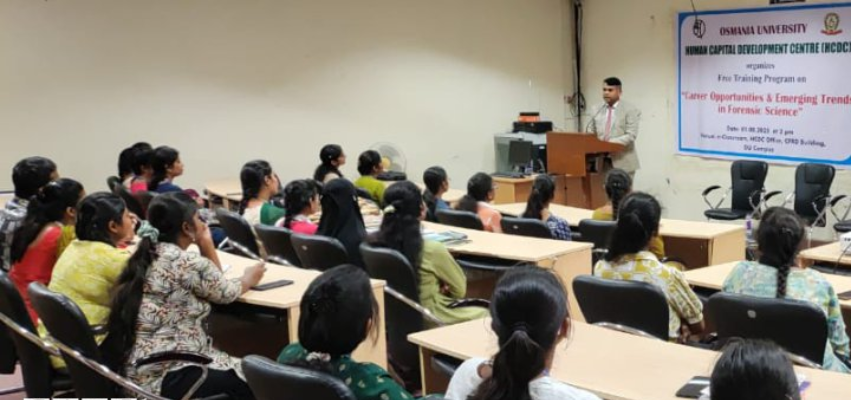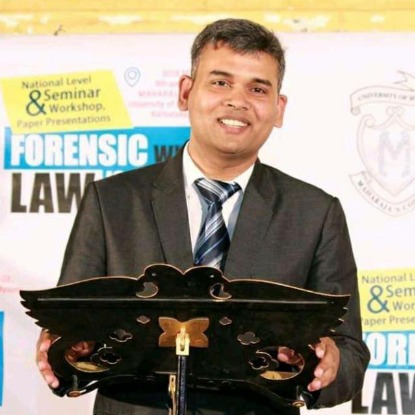Every time I walk into a classroom full of curious young minds, I am reminded of why I chose to dedicate my career to forensic science.
The questions, the eagerness, and the fresh perspectives of students always bring renewed energy to the field I love so much.
Recently, I had the privilege of delivering an interactive session at Osmania University on the topic “Career Opportunities and Emerging Trends in Forensic Science " on 01 August 2025.
It was an enriching experience, both for me as a speaker and, I hope, for the students who joined the session with such enthusiasm.
The Theme: Bridging Passion with Purpose
Forensic science has always fascinated people because of its connection with truth, justice, and investigation.
But what excites me most today is how rapidly this discipline is evolving.
With technological advancements transforming the way we live and work, forensic science is no exception.
During my session, I wanted students to see that a career in this field is no longer limited to traditional crime scene investigation.
It is expanding into areas like cyber forensics, forensic psychology, multimedia forensics, and digital imaging.
The message I tried to convey was simple: if you are passionate about science and justice, forensic science gives you the platform to turn that passion into purpose.
How Technology is Shaping the Future?
One of the key points I discussed was the impact of technology on forensic practices.
Just a decade ago, handwriting examination or fingerprint matching required long manual processes.
Today, AI-driven software tools can analyze samples in a fraction of the time.
Similarly, the use of advanced imaging systems, DNA sequencing technologies, and cyber forensics tools is revolutionizing how investigations are conducted.
I encouraged students to look at these advancements not as challenges but as opportunities. The future forensic expert will need to be as comfortable with digital tools as they are with physical evidence.
For example, in cyber forensics, professionals are required to trace digital footprints left in emails, servers, or even blockchain transactions, skills that weren’t even part of mainstream forensic science training just a few years ago.
The Value of Practical Skills
Theory is important, but in forensic science, it’s the hands-on practice that truly builds expertise.
I stressed the importance of practical exposure to real-world scenarios, be it mock crime scenes, lab experiments, or internships.
Students were especially eager to hear about how fieldwork brings classroom lessons to life.
I shared stories of my own experiences in investigations where quick thinking, teamwork, and application of practical knowledge made all the difference.
Forensic science is not just about solving mysteries on paper; it’s about standing in a crime scene, noticing the smallest details, preserving evidence carefully, and then piecing it all together.
That level of skill comes only when theory and practice go hand in hand.
Teamwork: The Silent Strength of Forensics
Another aspect I highlighted was the role of teamwork. Forensic science is often portrayed as a lone investigator cracking a case, but the reality is very different.
A successful investigation requires the combined efforts of experts in DNA analysis, digital forensics, ballistics, toxicology, psychology, and more.
Each member of the team contributes a piece of the puzzle, and only when those pieces come together does the bigger picture emerge.
I wanted students to understand that collaboration, communication, and respect for interdisciplinary expertise are just as important as technical knowledge.
The ability to work effectively in a team will define their success in this field as much as their individual skills.
Student Curiosity and Engagement
What truly made the session memorable for me was the level of curiosity from the students.
Their questions were thoughtful and forward-looking:
What kind of role will AI play in forensic science in the next decade?
How can students prepare for careers in lesser-known areas like forensic linguistics or financial forensics?
What global opportunities exist for Indian forensic science graduates?
These questions showed me that the new generation is not just seeking jobs, they are seeking impactful careers.
I reassured them that the scope of forensic science is vast and growing, not only within India but also across international platforms.
With the right combination of skills, dedication, and adaptability, they can become pioneers in emerging areas.
Looking Ahead
As the session concluded, I felt a deep sense of satisfaction. Speaking at Osmania University was not just about sharing my knowledge; it was about igniting a spark in future professionals who will take this field to new heights.
The students’ energy reminded me that the future of forensic science is in good hands.
I am grateful to the faculty and organizers who made this interactive session possible. Their commitment to providing students with exposure to real-world insights is commendable.
Platforms like these bridge the gap between academic learning and industry expectations, preparing students to thrive in the professional world.
Forensic science is at a turning point. With technology opening new doors and crime becoming more complex, the demand for skilled professionals will only increase.
My advice to students was to embrace continuous learning, stay updated with technological trends, and never underestimate the power of teamwork.
As I walked out of the hall that day, I carried with me a renewed optimism. The future of forensic science is dynamic, challenging, and full of opportunities and the young minds I met at Osmania University are ready to shape it.
Final Thoughts
Forensic science is not just about solving crimes; it’s about upholding truth and justice in an ever-changing world.
And as I reflect on my time with the students, I am reminded that the future of this discipline is as exciting as it is important.
Together, with curiosity and courage, we will continue to push the boundaries of what’s possible.


